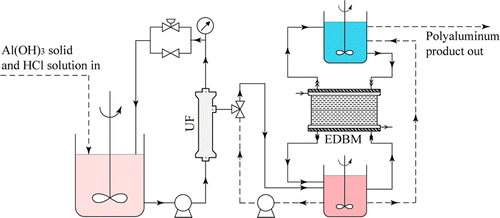侧边栏
Green Production of Ultrahigh-Basicity Polyaluminum Salts with Maximum Atomic Economy by Ultrafiltration and Electrodialysis with Bipolar Membranes
Ind. Eng. Chem. Res., 2014, 53(34), pp 13467–13474 (18 August, 2014)
By Qing Chen, Chang Xue, Wei-Ming Zhang*, Wei-Guo Song*, Li-Jun Wan, and Kun-Song Ma
10.1021/ie5023546 local fulltext
Ultrahigh-basicity polyaluminum, an important aluminum industrial product, is manufactured by the oxidation of metallic Al with acids. The process is not economically and chemically efficient because the aluminum atoms were reduced first from alumina to aluminum metal and then oxidized again to get the polyaluminum. In this work, an integrated synthesis system has been built to produce ultrahigh-basicity polyaluminum salts, including polyaluminum chloride, sulfate, and nitrate, from aluminum hydroxide and corresponding acids directly at normal temperature and pressure. Ultrafiltration and electrodialysis with bipolar membranes work in tandem during the synthesis. Aluminum salts are produced naturally from aluminum hydroxide solids and acids in a mixing tank, which are separated as pure solutions via ultrafiltration and then basified in an electrodialysis stack with bipolar membranes to get polyaluminum and regenerate acids as byproducts. These acids are sent back to the mixing tank for reuse again. This integrated system works with maximum atomic economy and low overall cost, which makes it a green process for the production of polyaluminum salts.


